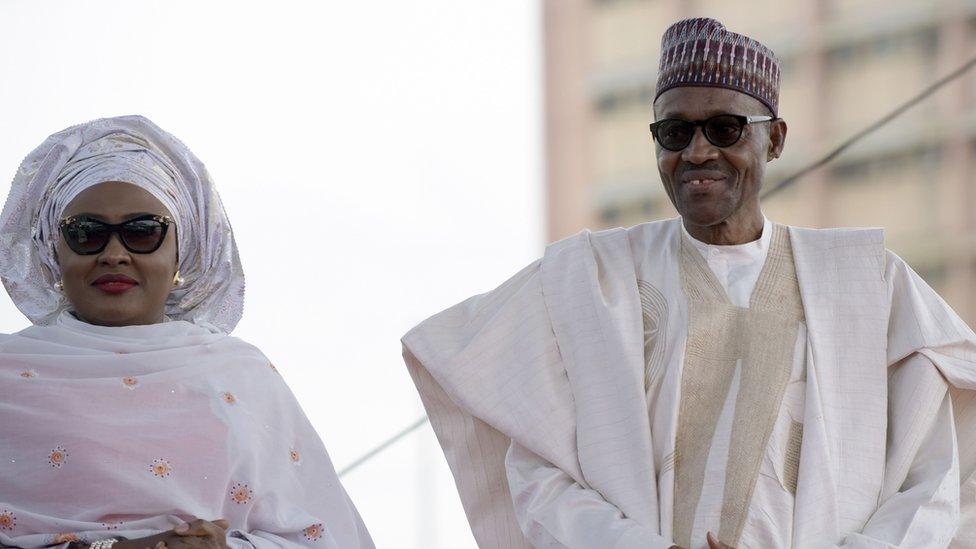Letter from Africa: Mr Buhari, your wife belongs everywhere
- Published
Nigeria President Muhammadu Buhari made his controversial comments standing alongside German Chancellor Angela Merkel
In our series of letters from African journalists, Ghanaian writer Elizabeth Ohene reflects on Muhammadu Buhari's recent comments about his wife and offers her view of what Nigeria's president got wrong.
I went to a wedding in Washington DC this past week. I mention it because wives have been on my mind thanks to the comments made by Nigerian President Muhammadu Buhari about his wife.
The president had offered what was supposed to be one of the biggest putdowns in public discourse: "My wife belongs in the kitchen, in the living room and in the other room."
In other words, President Buhari was suggesting that his wife had stepped outside her allotted space by talking about politics.
Political talk does not belong in the kitchen, governance talk does not belong in the living room and electoral matters do not belong in the other room.
I acknowledge that the president's spokesperson has urged all of us to get a life and recognize that President Buhari was joking and we should not take his words seriously and I will keep this firmly in my mind.

Aisha Buhari threatened to boycott her husband's re-election if he did not show better leadership
So where does my wedding I went to come into the discussion, or maybe the legitimate question is where do marriage ceremonies belong? In the kitchen, in the living room or in the other room?
Keeping men out of it
In Ghana, marriages are the coming together of two families rather than the coming together of two individuals.
At the ceremony that I went to in Washington DC, the bride was born in the US to Ghanaian parents, while the groom was born to American parents.
I discovered during the weekend of the various mostly Ghanaian ceremonies that the groom's family was not in the least bit fazed by the prospect of "the coming together of two families" as I had feared.
One of them was however very puzzled by the fact that according to Ghanaian custom, there was no role for men in the marriage ceremony; apart from the groom that is.
The entire Ghanaian traditional marriage ceremony is conducted by the women on both sides of the family and men are only allowed to sit in as spectators. I must confess I had never considered the unfairness of keeping out the men from the ceremony.

Elizabeth Ohene:

"The things Aisha Buhari said in her interview with the BBC Hausa Service have probably been said by many other Nigerians and I suspect the president has heard them."

At the end of it all, I said I might consider leading a movement to change the discrimination against men in Ghana which shuts them out of playing roles in marriage ceremonies.
The events of this past week involving two very high profile wives have brought the issue very much to the fore for me.
The First Lady of the United States (Flotus) Michelle Obama and the First Lady of the Federal Republic of Nigeria (Flofron) Aisha Buhari, within hours of each other had captured the headlines in the most spectacular manner.
The things Mrs Buhari said in her interview with the BBC Hausa Service have probably been said by many other Nigerians and I suspect the president has heard them.
He knows that the same words coming from his wife, however suddenly assume more significance.
Front room
Then there has been the dramatic intervention of Michelle Obama in the Donald Trump "locker-room" tape brouhaha.
With one speech, she elevated the US election debate to a higher, more dignified level.
Michelle Obama slams Trump over his attitudes to women
Mrs Obama speaks from the kitchen, she speaks from the living room, she speaks from the street, she speaks from the campaign trail and yes, she speaks from "the other room" also known as the bedroom.
Dear Mr Buhari, we do not shy away from mentioning the bedroom.
Mrs Obama also speaks from the corporate boardroom and wherever she speaks, her words deserve to be listened to.
Aisha Buhari, like Michelle Obama, belongs in, and speaks from, the front room and we hear her.
I think I will support the continuing practice of limiting the marriage ceremony transactions to the females after all.
It emphasizes the point that wives belong in the front room.

More from Elizabeth Ohene:
